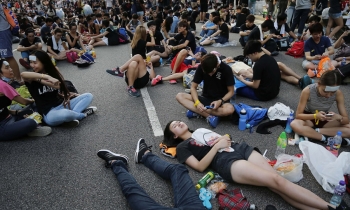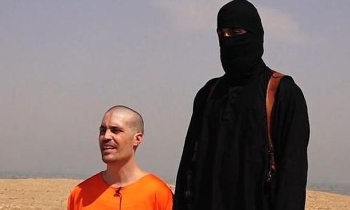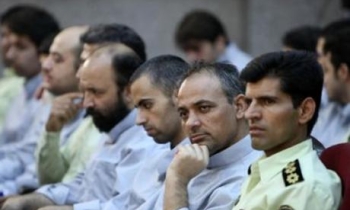BERKELEY, California, Jan 31 (IPS) - In a new blow to free expression in Iran, security forces arrested three members of a 15-woman delegation of journalists en route to a training workshop in India last week, accusing them of infringing national security interests and threatening them with trial.
After being interrogated at the airport Jan. 25, their passports were confiscated and they were sent to the notorious Evin jail near Tehran.
Farnaz Seify, a journalist and blogger, was among the three women who were detained. She told IPS that the interrogators asked her about who was funding the workshop.
"They are suspicious about any kind of support by foreigners who try to approach journalists in Iran," she said.
The arrest of the three journalists and activists -- Seify, Mansooreh Shojayee and Tal'at Taghinia -- prompted domestic and international protests against the mistreatment of civil society here. Although the women were released after 30 hours, they are accused of acting against national security interests and could face trial in less than two months.
Shirin Ebadi, the 2003 Iranian Noble Peace Laureate, has agreed to defend the three, noting that participating in an educational workshop is not a crime -- and if it were, they were never even given the opportunity to attend.
Many observers and activists say the crackdown on intellectuals and government critics has worsened since the U.S. State Department declared last February that it was creating a 75-million-dollar fund to "reach out to the people of Iran". According to the funding request, this would include "(expanding) our outreach to young Iranians with five million dollars for Iranian student education and international visitors programmes designed to build bridges between the people of our two nations". The Netherlands has created a similar fund.
Since the U.S. announcement, the Islamic government has closely monitored any support for journalists and intellectuals by international organisations, and has attempted to disconnect them from the outside world.
"Intelligence agents were suspicious of the Dutch parliament's fund allocation for the promotion of democracy in Iran. They questioned us about the organisers of the conference, and where it was being sourced," Seify said in an interview a few hours after being released from detention.
Her father, Ali Seify, was very surprised to hear of his daughter's arrest. "First there must be a crime committed before there is an arrest. This type of behaviour is inhumane... they should not treat intellectuals like criminals and murderers, dragging them to jail and then interrogating them," he said.
"It is very clear what intellectuals do at their jobs and these security forces know exactly what activities people similar to my daughter are involved in -- better than family members like myself. Treating them in such a manner, with full knowledge of their innocence, is simply unacceptable," he told IPS.
Farnaz Seify said that "after stamping the passports, the officials confiscated all 15 passports, and we were surrounded by almost 13 security officers. They led us to a room in the basement, took our cell phones and showed arrest orders for three of us. They escorted us to Evin in three police cars."
"They told us that their intention is to prevent the corruption of Iranian journalists by the enemies of the Islamic regime," she said.
Security forces told Seify and the others that they will be summoned and interrogated again in the future, and perhaps face trial.
Iranian officials have repeatedly raised concerns about attempts by foreigners, and particularly the United States, to launch a so-called Velvet or Orange Revolution in Iran, by building civil society networks and empowering activists, similar to the one in Ukraine in 2003.
In mid-November, 21 Iranian journalists were interrogated at Tehran airport by the authorities after returning from a workshop they attended in Hilversum and Amsterdam. The journalists said they were asked personal questions for three hours that had scant relevance to a serious investigation.
A week after the interrogations, Hasan Saffar Harandi, Iran's minister of Culture and Islamic Guidance, said that foreign interference in Iranian affairs was widespread, but dismissed it as largely ineffective. "These projects have been successful in a few countries, so the organisers think they can achieve their goals in Iran too. However, there is [little] possibility for a 'colour revolution' in Iran," said Harandi.
Parastoo Dokouhaki, a journalist and blogger, told IPS that "The Iranian government claims that they don't need this support and the human rights situation in Iran is pretty good."
"When journalists participate in courses or conferences abroad, they are erroneously labeled as spies. Journalists and activists take advantage of every opportunity they can to develop their skills," added Dokouhaki in a phone interview from Tehran.
"Officials have no real concerns about the content of these conferences, but are afraid of the dissemination of information, potentially resulting in furthering the cause of democracy in Iran," she said.
On Nov. 26, security agents arrested Ali Farahbakhsh, a prominent journalist who was returning from a conference on media and government in Bangkok. He is still in Evin prison without charge, although his lawyer says he has been accused of espionage.
Ramin Jahanbeglu, a renowned Iranian intellectual, was also detained for more than five months when he came back from a trip to India, where he was conducting research in April 2006.
Dokouhaki believes that since hardliner President Mahmoud Ahmadinejad came to office in August 2005, the government has become even less tolerant. "Journalists are the victims of these tough policies," she added.
In the past few months, security forces have shown particular interest in the ties between journalists, intellectuals, and activists and organisations abroad. However, not a single accusation against any of them been has been proven to date.
*Omid Memarian is an Iranian journalist and civil society activist. He has won several awards, including Human Rights Watch's highest honour in 2005, the Human Rights Defender Award.









